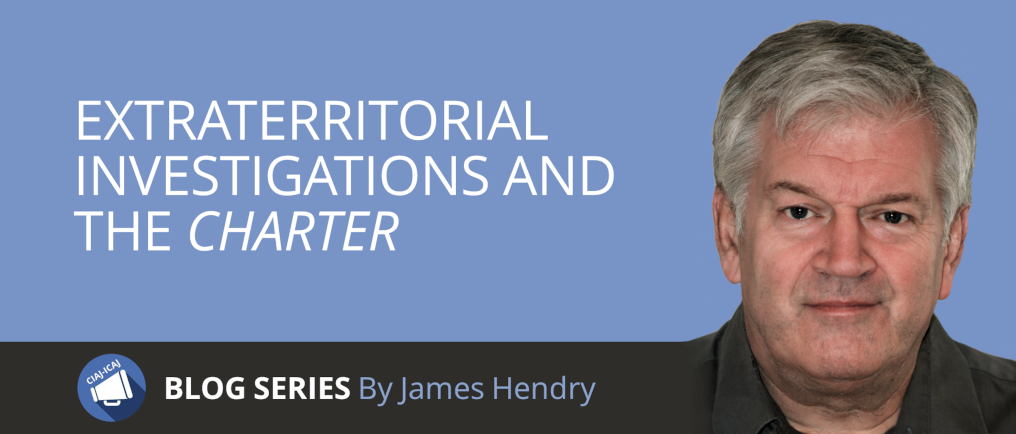Extraterritorial Investigations and the Charter

This blog post is part of a series on “SCC Decisions and more” written by CIAJ’s collaborator James Hendry. Read all his posts here.
Recently, the Supreme Court of Canada was faced with two interlocking issues in McGregor. They arose from a charge of voyeurism against a member of the Canadian Armed Forces attached to the Canadian Embassy in Washington DC and with a private residence in nearby Virginia. One was whether a combined CAF and Virginia police search complied with the Charter. The weightier issue and the scaffold for the other was whether the Court should revisit its decision in Hape, holding the Charter did not apply to extraterritorial searches. All but two members of the Court were able to skirt the Hape question because it had not been raised by the parties nor was it necessary to decide it the given the majority finding that there was no s. 8 Charter breach on the assumption the Charter did apply.
The search
The majority was meticulous as it parsed the steps taken by the police and CAF investigators required by s. 8. First, the CAF investigators got a waiver of diplomatic immunity from the Canadian Embassy for a search of the accused’s private property and then the police got a warrant for the charge of voyeurism covering the search of digital devices from the appropriate authority under Virginia law. The search was minimally intrusive. The CAF investigators took control once the police breached the door. Importantly, unanticipated evidence of sexual assault on the devices discovered during triage was lawful under the Canadian plain view doctrine because it was immediately obvious and discovered inadvertently by the investigators and set aside for further authorization. The devices containing this new evidence were immediately sent back to Canada and accessed only after obtaining a Canadian warrant. Because the search was reasonable, the Court held there was no need to consider exclusion under s. 24(2) of the Charter.
The accused was arrested by the CAF investigator in Washington and informed of his s. 10(b) right to counsel. Canadian criminal law applied to him by the National Defence Act and by treaty with the US, but not to the search of his premises.
The challenge to Hape
The concurring justices characterized the Charter’s extraterritorial application as a threshold issue and one that had been argued by parties and interveners (para. 47). They identified flaws in the reasoning of Hape. First, international law does not restrict the scope of the Charter. Second, requiring Canadian officials to comply with the Charter does not violate local sovereignty if they act consistently with local law and procedure. Third, the local state’s consent to the application of the Charter to a local Canadian investigation will rarely be given. But the Court accepted cooperation with local law enforcement as sufficient for a reasonable search. Fourth, the exception to the rule that local law governs except where they would cause Canadian investigators to be in breach of Canada’s international human rights obligations would lead to confusion. Fifth, failing the application of the Charter to extraterritorial searches would mean an accused would receive only fair trial protections of ss. 7 and 11(d) rather than full Charter protections, including s. 8 (paras. 67–76).
In the end though, the concurring justices decided reconsidering Hape should wait because the majority found no s. 8 breach and had refused to engage on the extraterritoriality issue (paras. 49,79).
Importantly, they did not elaborate on how the Charter would apply abroad—surely a central question—a question that they acknowledged was not fully argued before them (para. 80).
The role of interveners
Interveners asked the Court to revisit Hape.
The majority schooled the interveners on their role: they were to assist the Court deciding the questions posed by the parties, not raise new issues and evidence. The majority also noted that academic criticism of Hape was not enough to undermine its authority.
The concurring justices noted the intervener arguments and said they had provided useful and different submissions on the threshold issue of whether the Charter applied to the conduct of the investigators. They agreed with the majority that interveners could not introduce new issues (para. 82, see also Le-Vel para. 20, Lesiuk para. 20), but thought revisiting Hape would enlarge issue before the Court. Interestingly, some interveners got standing to raise this very issue (para. 81).
The ”Charterability” of the search issue abroad
Interestingly, the majority was quite able to deal with complex Charter questions arising during the search in the US. For example, it held it necessary to apply the “Canadian” plain view doctrine to the search taking place in the US to justify seizing the device containing the sexual assault evidence outside the warrant. The concurring justices did not think that plain view doctrine needed to be invoked because merely seeing evidence of sexual assault did not constitute a seizure of it (para. 91). The majority also considered whether the evidence should be excluded applying s. 24(2) rather than considering its effect on a fair trial under s. 7 and 11(d).
LeBel J in Hape at para.91 said that enforcing the Charter after the fact, as the Court did in this case, would not interfere with US sovereignty because the hearing was carried out in Canada. But this fell short of the purpose of the Charter which was meant to be proactive. No doubt. But this may be the way to learn how this can be done in varied jurisdictions.
While the Court was able to apply the assumption the Charter applied as the scaffolding of its analysis of the search and seizure in this case, the US system is like ours. The finding that the search was reasonable allowed the Court to forgo answering the actual “scaffolding” question. However, if the Canadian investigators had worked with a police force in another, more alien jurisdiction where the police just kick the door down without a warrant, presumably the search would have been found unreasonable and the search issue would have to be determined according to Hape, placing its correctness in question once again. The evidence gathered from such a search would have to be judged by its interference with the accused’s ss. 7 and 11(d) fair trial rights, which the concurring justices noted would not provide as complete Charter protection as overruling Hape (para. 76).
Importantly, the determinative finding in this case was that a search conducted in the US was reasonable according to Canadian Charter principles. The question about whether the Charter applied was not even reached.
Facing the multitude of jurisdictions in which searches will have to be carried out by Canadian investigators, the Court wisely left the interveners’ challenge to Hape for another day. The increasingly important area of multi-national law enforcement is very complex. But surely the Charter must follow Canadian officials wherever they engage in this country’s business and guide their actions as much as possible to ensure Canadians abroad get as full protection as possible.

